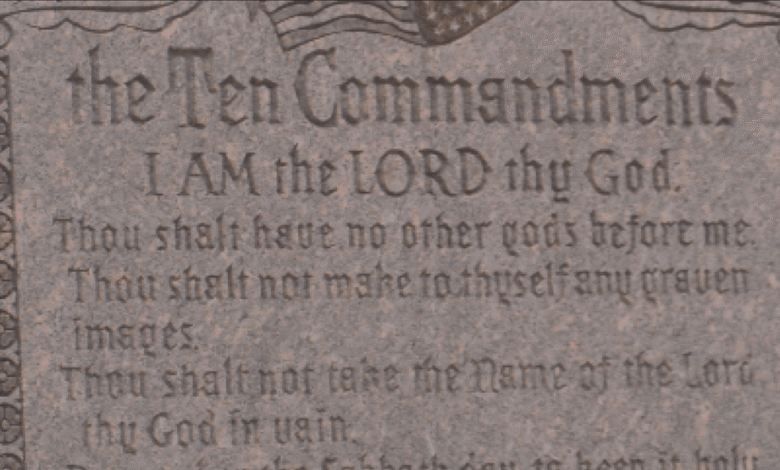Ten Commandments Bill Texas Passes Key Legislative Hurdle

In a significant development for public school legislation in Texas, the Ten Commandments bill has successfully passed through a key legislative hurdle, making its way to Governor Greg Abbott’s desk for approval. This measure, which mandates the display of the Ten Commandments in every public school classroom, was approved by the Texas House of Representatives with a vote of 82-46. Advocates argue that this Texas education law aligns with the state’s values, fostering an environment of moral clarity among students. On the other hand, opponents have raised concerns about the implications for religious displays in schools and the separation of church and state. As SB 10 Texas moves closer to becoming law, the future of religious expression within educational institutions is under intense scrutiny.
As Texas lawmakers push for a greater presence of moral and ethical teachings in educational settings, the recently passed Ten Commandments legislation symbolizes a pivotal shift in the state’s approach to public school policy. This initiative, widely known as SB 10, emphasizes the importance of foundational religious texts in shaping students’ character and values. Governor Abbott’s anticipated endorsement of this bill further underscores the Republican agenda concerning educational reforms and religious representation within Texas schools. Supporters of the bill argue that such displays can enrich the learning environment, while critics fear it may undermine the secular nature of public education. The ongoing discussions surrounding this legislation reflect a broader conversation about the role of religion in state-sponsored education.
Overview of the Ten Commandments Bill in Texas
The recent passage of the Ten Commandments bill, known as SB 10, marks a significant legislative step in Texas public education. With a vote of 82-46 in the House of Representatives, the bill mandates that the Ten Commandments be displayed in every public school classroom across the state. This move has sparked considerable debate among lawmakers, particularly around the implications of religious displays in schools and their impact on the educational environment. Governor Greg Abbott is expected to endorse this measure, continuing his administration’s efforts to promote religious education within Texas legislation.
Legal experts and educators are closely examining the broader implications of the Ten Commandments bill. It is crucial to understand how this law intersects with existing Texas education law and the First Amendment rights of students and faculty. Critics argue that while the bill aims to instill moral values, it poses challenges regarding the separation of church and state. As discussions unfold, the importance of public school legislation that accommodates diverse faiths and beliefs becomes increasingly relevant, especially at a time when public education is under constant scrutiny.
Legislative Journey of SB 10 Texas
The journey of SB 10 Texas through the legislative process highlights the contentious nature of schoolhouse religion in public institutions. Initially, the bill faced significant pushback from Democrats who proposed amendments aimed at allowing school districts more autonomy in implementing the law. For instance, a proposal to present the Ten Commandments in multiple languages was rejected, reflecting the Republican majority’s commitment to a uniform approach. The passage of this bill could set a precedent for future public school legislation concerning similar religious displays.
As the bill moves toward Governor Abbott’s desk, its journey encapsulates the broader national dialogue on education and governance. Legislators like Lieutenant Governor Dan Patrick have championed this bill, indicating its significance within the Republican platform. The successful navigation through the various legislative hurdles may embolden similar efforts in other states, potentially influencing public school policy nationwide. As such, the SB 10 Texas bill serves not only local educational policies but also resonates with national trends in the discussion about religious influence in public education.
Impact on Religious Displays in Schools
The implementation of the Ten Commandments bill in Texas raises critical questions about the extent and nature of religious displays in public schools. Proponents argue that such displays can reinforce moral education, offering students guidance on ethical behavior. However, this perspective overlooks the diverse belief systems present in Texas public schools. The legislation’s potential to foster an environment of exclusion for non-Christian students cannot be ignored, prompting significant concern among educators and parents alike.
Furthermore, the anticipated legal challenges cannot be underestimated. Previous cases regarding religious displays in public spaces have often found their way to court, particularly when such measures are perceived to violate the First Amendment. As schools prepare to enact the Ten Commandments bill, administrators must navigate a precarious balance between following the law and respecting the diverse religious beliefs of their student bodies. The future of religious displays in schools in Texas will likely set a benchmark for similar legislative actions across the United States.
Governor Abbott’s Role and Support
Governor Greg Abbott’s anticipated support for the Ten Commandments bill reflects his broader political strategy of aligning education policy with conservative values. With a strong backing from Republican lawmakers, Abbott’s endorsement signifies a commitment to religious principles within the Texas education system. His administration has previously emphasized the importance of promoting traditional values in schools, and the Ten Commandments bill is seen as a pivotal step toward achieving this aim.
The governor’s role will be crucial in framing the narrative surrounding this legislation. By signing SB 10 into law, Abbott could not only influence educational practices in Texas but also bolster his standing among conservative constituents. This move, however, may have repercussions in the upcoming elections, as debates around educational policy continue to shape voter perspectives. Abbott’s position illustrates the intertwining of politics and education, highlighting the significant implications of religious legislation in public schooling.
The Role of Public Opinion in Legislative Decisions
Public opinion plays a vital role in shaping legislative outcomes, and the Ten Commandments bill is no exception. In the lead-up to the House vote, the perspectives of Texas citizens revealed a divided sentiment regarding its implementation in public education. While some communities support the resurgence of religious principles in schools, others voice strong opposition, fearing the erosion of secular education. As opinions shift, lawmakers must weigh constituents’ feelings against party lines when making critical decisions.
The contrasting viewpoints on the Ten Commandments bill forecast potential challenges ahead, both for the bill’s advocates and its critics. As the public discourse unfolds, it remains essential to consider how community values will ultimately influence the successful execution of SB 10. Lawmakers may need to engage with their constituents actively to navigate these complexities and assess the long-term effects of such legislation on Texas’s public school system.
Future of Religious Education Laws
The passing of the Ten Commandments bill in Texas signifies a broader trend toward incorporating religious education laws into public schooling. If Governor Abbott signs SB 10 into law, it could pave the way for similar initiatives in other states, igniting national conversations about the role of faith in education. As discussions unfold, educators and policymakers must evaluate how such legislation aligns with constitutional parameters and what impact it may have on curricular choices in public schools.
Additionally, the future of religious education laws could spur more comprehensive legislation that addresses a wider range of religious beliefs beyond Christianity. The potential for laws that promote a diversity of religious education in public schooling raises important questions about inclusivity and representation. As the conversation progresses, stakeholders must consider how to cultivate an educational environment that honors diverse viewpoints while remaining compliant with constitutional obligations.
The Effects of Legislative Changes on Educators
As the Ten Commandments bill moves closer to becoming law, educators are left to grapple with the potential changes it brings to their classrooms. The requirement for displaying the Ten Commandments could create an uncomfortable atmosphere for teachers who may not share the same religious views. In an increasingly diverse educational landscape, this could pose challenges for educators aiming to create inclusive learning environments that respect all students’ backgrounds and beliefs.
Moreover, public school teachers may face dilemmas regarding the integration of religious content into their curriculum. Training and resources might be necessary to equip educators with the tools to navigate this new legislation effectively while adhering to legal boundaries set by the First Amendment. The upcoming implementation of the SB 10 Texas bill underscores the crucial need for professional development in addressing religious content in educational settings.
Legal Challenges Ahead for SB 10 Texas
The Ten Commandments bill, while gaining legislative support in Texas, is not exempt from future legal challenges. Given the historical context of similar cases dealing with religious displays in public education, various advocacy groups have indicated that they may contest the bill’s constitutionality in court. Legal experts suggest that its implementation might trigger debates on the separation of church and state and potential violations of students’ rights.
As stakeholders prepare for possible litigation, it is essential to consider the implications of the SB 10 Texas bill on the state’s educational framework. The outcomes of any legal battles could set critical precedents for how similar bills are approached in Texas and elsewhere. Schools and lawmakers must be vigilant in understanding not only the potential benefits but also the legal ramifications that may arise as they navigate this contentious issue.
Community Reactions to the Ten Commandments in Schools
The introduction of the Ten Commandments bill has prompted a diverse array of reactions from the Texas community. Supporters of the legislation often cite the significance of moral education and the need for guiding principles in schools. Many parents express a desire for clearer ethical frameworks within their children’s education, seeing the bill as an opportunity to return Christianity to public life.
Conversely, opponents of the bill voice concerns about the implications of enforcing religious beliefs in public education. Many advocate for the importance of maintaining a secular environment in schools, emphasizing that public institutions should honor all students’ beliefs, not just those of a majority. The community’s response to the Ten Commandments bill serves as a reflection of Texas’s rich cultural diversity, highlighting the complex interplay between faith and public education.
Frequently Asked Questions
What is the Ten Commandments bill Texas (SB 10) about?
The Ten Commandments bill Texas, officially known as SB 10, mandates the display of the Ten Commandments in every public school classroom across Texas. This legislation has recently passed significant legislative hurdles and awaits the signature of Governor Greg Abbott.
What has been the legislative journey of the Ten Commandments bill Texas?
The Ten Commandments bill Texas, SB 10, successfully passed the state House of Representatives with a vote of 82-46 after extensive debates. The bill was previously approved by the Texas Senate, indicating strong legislative support before being sent to Governor Abbott.
How does the Ten Commandments bill Texas affect public schools?
The Ten Commandments bill Texas will impact public school legislation by requiring the installation of displays featuring the Ten Commandments in classrooms. This law aims to integrate religious displays into the educational environment, aligning with the priorities of Texas officials.
What is Governor Abbott’s position on the Ten Commandments bill Texas?
While Governor Abbott’s office has not commented officially, he is expected to sign the Ten Commandments bill Texas into law, as he has historically supported legislation that promotes religious displays in schools, echoing the sentiments of other Republican leaders in the state.
What opposition has the Ten Commandments bill Texas faced?
The Ten Commandments bill Texas faced opposition from Democratic lawmakers who proposed amendments, including allowing school districts to opt in and translating the Ten Commandments into various languages. However, these suggestions were rejected by the Republican majority.
Why is the Ten Commandments bill Texas considered important by its supporters?
Supporters view the Ten Commandments bill Texas as a means to reinforce moral values and historical religious principles within the public education system, aligning with the beliefs of many constituents advocating for religious displays in schools.
What are the implications of the Ten Commandments bill Texas for religious freedom?
The Ten Commandments bill Texas raises debates about the balance between religious freedom and the separation of church and state. Proponents argue that it allows for the expression of religious beliefs, while opponents express concerns about its appropriateness in public education.
When was the Ten Commandments bill Texas introduced and who sponsored it?
The Ten Commandments bill Texas was introduced in 2023 and sponsored by Republican legislators. It has garnered attention from various political leaders, with Lieutenant Governor Dan Patrick marking it as a legislative priority.
| Key Points | Details |
|---|---|
| Legislative Progress | The Ten Commandments bill has passed the Texas House of Representatives with a vote of 82-46. |
| Governor’s Response | Governor Greg Abbott is expected to sign the bill into law after its passage. |
| Amendments and Debate | Proposed amendments by Democrats to allow opt-in by school districts and present the commandments in multiple languages were rejected. |
| Legislative History | The state Senate approved the bill in March with a 20-11 party-line vote. |
| Prior Legislation | Similar legislation failed in 2023 due to time constraints. |
| Current Legislative Session | Lieutenant Governor Dan Patrick stated that SB 10 is a priority for the current legislative session. |
Summary
The Ten Commandments bill Texas has made significant strides in its legislative journey, having recently passed the House of Representatives and awaiting the signature of Governor Greg Abbott. This legislative measure aims to require the Ten Commandments to be displayed in every public school classroom in the state. Despite opposition and failed amendments by the Democrats during debates, the Republican majority has pushed the bill through, marking a notable moment in Texas’s ongoing discussions around educational and religious displays in public schools.




